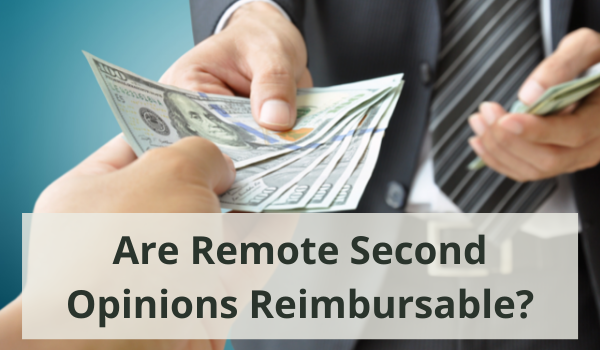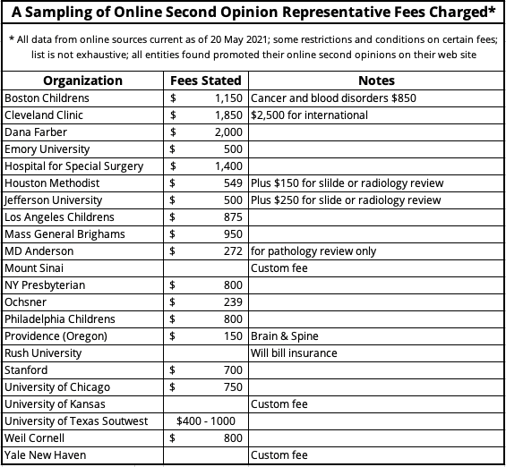How to Get Paid for Remote Expert Opinions

.png?width=600&name=_Blog%20Graphics%20(36).png)
There is a growing list of hospitals adopting online or remote second opinions (RSOs). Second opinions, in general, are becoming more accepted by both patients and physicians, and telemedicine or remote medical encounters are becoming increasingly popular. This has led patients who are diagnosed with critical medical issues to seek ways to avail themselves of specialty medical knowledge and experience from providers that are not necessarily local to them.
Download the Article: Remote Second Opinions 101
Are Remote Second Opinions Reimbursable?
The vast majority of hospitals offering remote second opinions ask patients to pay out of pocket for these services. Even though today most online diagnoses are reimbursable under the CARES act, most remote second opinions are not. In actuality, some of the activities comprising a remote second opinion are potentially reimbursable by both Medicare/Medicaid and private insurance. These often include a secondary review of radiological images or pathology slides. But almost all second opinion offerers, leave seeking insurance reimbursement, if there is any, up to the patient.
The fees charged for remote second opinions vary greatly. A sampling of what you can find online is included in the table below. Note that all these fees don’t necessarily relate to exactly the same services and shouldn’t be used for price comparison.

What is clear from the table is that most hospitals don’t expect the fees the patient pays for a second opinion will generate much in the way of profit. Instead, they have other motives. Hospitals that offer remote second opinions are focused on the "long game."
The True Value of Remote Second Opinions
Second opinions give hospitals a chance to expand their geographic appeal well beyond their bricks and mortar. Most hospitals typically attract the vast majority of their patients from less than twenty miles from their physical location. Remote second opinions give hospitals that offer them, the opportunity to attract patients from almost anywhere. Many remote second opinions are offered to patients residing in different states in the US as well as abroad.
Remote second opinions may lead to other medical procedures plus inpatient visits. One Ohio hospital found that more than half of second opinion patients became inpatients within 15 months. For patients unwilling to make a longer trek for a critical procedure, introducing that patient to the facility via a remote second opinion is often both a way to deliver expertise as well as very effective marketing.
Often, patients with chronic illnesses develop a lifelong relationship with the hospital that offered them their remote second opinion.
Further, exposing the hospital’s deep specialized expertise via a remote second opinion is a great way to enhance a hospital’s brand. In the past, hospitals have not had the needed to market their services. However, in the new world of medical care, there are many competing resources nipping at the heels of the traditional hospital, increasing the need for more aggressive marketing activities.
Second opinions generally utilize the hospital’s most important and scarce asset – physician expertise in a particular subspecialty. It is important to ensure that this resource is used wisely. By focusing on a strategic goal of expanding the hospital’s overall reach, most hospitals are finding that remote second opinions are an important part of how hospitals can more effectively market their services.


